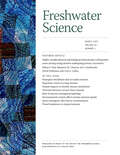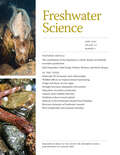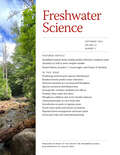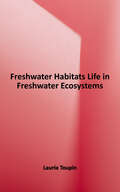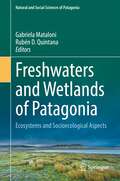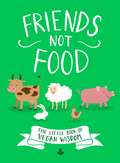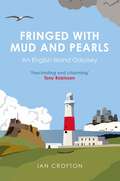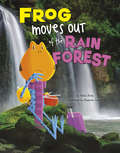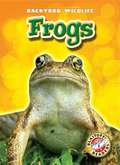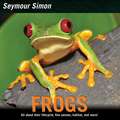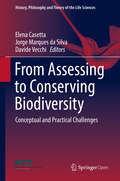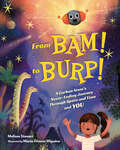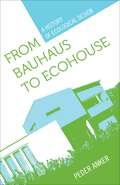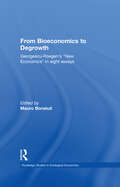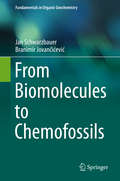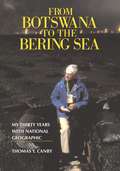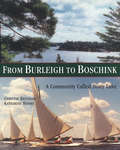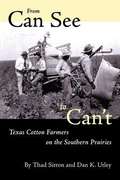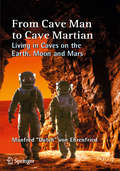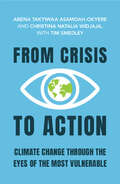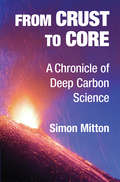- Table View
- List View
Freshwater Science, volume 44 number 1 (March 2025)
by Freshwater ScienceThis is volume 44 issue 1 of Freshwater Science. Freshwater Science (FWS) publishes articles that advance understanding and environmental stewardship of all types of inland aquatic ecosystems (lakes, rivers, streams, reservoirs, subterranean, and estuaries) and ecosystems at the interface between aquatic and terrestrial habitats (wetlands, riparian areas, and floodplains). The journal regularly features papers on a wide range of topics, including physical, chemical, and biological properties of lentic and lotic habitats; ecosystem processes; structure and dynamics of populations, communities, and ecosystems; ecology, systematics, and genetics of freshwater organisms, from bacteria to vertebrates; linkages between freshwater and other ecosystems and between freshwater ecology and other aquatic sciences; bioassessment, conservation, and restoration; environmental management; and new or novel methods for basic or applied research.
Freshwater Science, volume 44 number 2 (June 2025)
by Freshwater ScienceThis is volume 44 issue 2 of Freshwater Science. Freshwater Science (FWS) publishes articles that advance understanding and environmental stewardship of all types of inland aquatic ecosystems (lakes, rivers, streams, reservoirs, subterranean, and estuaries) and ecosystems at the interface between aquatic and terrestrial habitats (wetlands, riparian areas, and floodplains). The journal regularly features papers on a wide range of topics, including physical, chemical, and biological properties of lentic and lotic habitats; ecosystem processes; structure and dynamics of populations, communities, and ecosystems; ecology, systematics, and genetics of freshwater organisms, from bacteria to vertebrates; linkages between freshwater and other ecosystems and between freshwater ecology and other aquatic sciences; bioassessment, conservation, and restoration; environmental management; and new or novel methods for basic or applied research.
Freshwater Science, volume 44 number 3 (September 2025)
by Freshwater ScienceThis is volume 44 issue 3 of Freshwater Science. Freshwater Science (FWS) publishes articles that advance understanding and environmental stewardship of all types of inland aquatic ecosystems (lakes, rivers, streams, reservoirs, subterranean, and estuaries) and ecosystems at the interface between aquatic and terrestrial habitats (wetlands, riparian areas, and floodplains). The journal regularly features papers on a wide range of topics, including physical, chemical, and biological properties of lentic and lotic habitats; ecosystem processes; structure and dynamics of populations, communities, and ecosystems; ecology, systematics, and genetics of freshwater organisms, from bacteria to vertebrates; linkages between freshwater and other ecosystems and between freshwater ecology and other aquatic sciences; bioassessment, conservation, and restoration; environmental management; and new or novel methods for basic or applied research.
Freshwater habitats : life in freshwater ecosystems
by Laurie ToupinA look at the plants, animals, locations, and various habitats that make up the freshwater ecosystems of the world.
Freshwaters and Wetlands of Patagonia: Ecosystems and Socioecological Aspects (Natural and Social Sciences of Patagonia)
by Gabriela Mataloni Rubén D. QuintanaThe Freshwaters of Patagonia adopts a socioecological approach, in which experts from across Patagonia review recent, scientifically rigorous literature and data of their own, thus synthesizing the current knowledge directly relevant to understand the present state and future trends of icefields, freshwater and wetland ecosystems in this region.The book’s organization into three parts provides a studied and comprehensive view on the patterns and processes of the various ecosystems in Patagonia, and describes the sociological aspects of freshwater ecosystems, as well as characterizes the conservation of the freshwater and wetland ecosystems, in Patagonia. The chapters offer a broad, state-of-the-art overview of the current status of glaciers, freshwater and wetland ecosystems of this region, as well as studies of both local and large scale biodiversity patterns, and study cases of extreme and naturally polluted environments.The volume concludes with the current status of Patagonian freshwaters, and discusses the scientific, legal and administrative tools aimed at their sustainable management within the framework of the UNEP Sustainable Development Goals 2030 Agenda. A broad audience of students, scientists, engineers, environmental managers, and policy makers will be interested in this volume.
Frieden in politischem Unsettlement: Jenseits von Konfliktlösung
by Jan PospisilDie internationale Friedensförderung ist in eine Sackgasse geraten. Ihre hochgesteckten Ziele haben bestenfalls zu einem mittelmäßigen Erfolg geführt, der von Momenten des völligen Scheiterns unterbrochen wurde. Die Diskreditierung des Begriffs "liberale Friedenskonsolidierung" hat dazu geführt, dass er sich weiterentwickelt hat, um auf die zahlreichen Kritiken zu reagieren. Begriffe wie "inklusiver Frieden" verbinden das liberale Paradigma mit kritischen Begriffen des Kontexts und der Notwendigkeit, Praktiken zu verfeinern, um "das Lokale" oder "Komplexität" zu berücksichtigen. Es ist jedoch unklar, wie sich dies in klare Leitlinien für die Praxis der Friedensförderung umsetzen lässt. Paradoxerweise hat die gegenwärtige Politik der Friedenskonsolidierung ein noch nie dagewesenes Maß an Vagheit erreicht. Frieden in der politischen Unruhe bietet eine alternative Antwort, die in einem neuen Diskurs verwurzelt ist, der darauf abzielt, sowohl auf die Erfahrungen der Arbeit in Friedensprozessen einzugehen. Es zeichnet ein neues Verständnis von Friedensprozessen als Institutionalisierung formalisierter politischer Unruhe und zeigt neue Wege auf, damit umzugehen. Das Buch zeigt auf, wie Friedensprozesse Formen der Uneinigkeit institutionalisieren und fortlaufende Prozesse schaffen, um sie zu bewältigen, anstatt sie zu lösen. Es schlägt einen bescheidenen Ansatz vor, um "Aufhänger" für künftige Prozesse zu schaffen und den Einsatz kreativer Nicht-Lösungen und Praktiken der Uneinigkeit zu maximieren, die als Wege für pragmatische Nachkriegsübergänge diskutiert werden. Nur wenn wir die Natur und die Techniken der formalisierten politischen Unruhe verstehen, können wir neue konstruktive Wege finden, mit ihr umzugehen.
Friends Not Food: The Little Book of Vegan Wisdom
by AnonymousChickens, Cows, Ducks, Sheep, Pigs, Rabbits, Trout, Salmon, Prawns, Lobsters - all of the animal kingdom - are not here for us to eat, we should be looking after them.Friends Not Food is a celebration of our relationship with our animal friends and is packed with vegan sayings as well as facts about both those animals and the industries that prey on them.The perfect gift for anyone who loves animals!And whilst you #StayHome, don't miss these other great titles from Sphere Books: ** Distract Yourself: 101 Positive Things to Do and Learn Whilst You Stay Home ** ** The Bumper Book of Would You Rather? Over 350 hilarious hypothetical questions for ages 6 to 106 **** Home Sweet Home: The Little Book of Natural Cleaning **** Shelf Respect: A Book Lovers' Guide to Curating Book Shelves at Home **
Friends Not Food: The Little Book of Vegan Wisdom
by AnonymousChickens, Cows, Ducks, Sheep, Pigs, Rabbits, Trout, Salmon, Prawns, Lobsters - all of the animal kingdom - are not here for us to eat, we should be looking after them.Friends Not Food is a celebration of our relationship with our animal friends and is packed with vegan sayings as well as facts about both those animals and the industries that prey on them.The perfect gift for anyone who loves animals!And whilst you #StayHome, don't miss these other great titles from Sphere Books: ** Distract Yourself: 101 Positive Things to Do and Learn Whilst You Stay Home **** The Bumper Book of Would You Rather? Over 350 hilarious hypothetical questions for ages 6 to 106 **** Home Sweet Home: The Little Book of Natural Cleaning **** Shelf Respect: A Book Lovers' Guide to Curating Book Shelves at Home **
Friends in Nature: Discover Earth's Amazing Ecosystems
by Marina RuizDiscover the incredible ways in which animals and plants help each other, the planet and YOU to thrive with this illustrated tale of symbiosis and ecology for children aged 5-7.Can you imagine a world where you had to do everything by yourself? It's pretty impossible. The truth is, everyone needs a little help from someone, or something.All living things in the natural world - from the trees and the bees to the dogs and the frogs - depend on one another. There wouldn't be a coral reef without the help of all the fish that have made it their home. Rainforests are only filled with lush and colourful plants because of the birds and mammals who eat and scatter their seeds. Acacia trees have a whole army of ants to protect them, while elephants rely on egrets to keep them parasite-free. And it's because of bees, wasps and butterflies that we have tasty fruit and vegetables to eat.Created by writer and artist Marina Ruiz, beautifully illustrated scenes reveal the wonderful connections and cooperation in nature. Narrative storytelling links every spread to the next, exploring how even the tiniest relationship has a big impact in keeping our planet's huge and complex web balanced.
Friends of the Earth: A History of American Environmentalism with 21 Activities (For Kids series #42)
by Pat MccarthyThe history of American environmentalism is the history of men and women who dedicated their lives to protecting the nation's natural heritage. Almost singlehandedly, John James Audubon introduced the study of birds in North America. John Muir pushed a president and a nation into setting aside vast preserves, including Yosemite, Sequoia, Mt. Rainier, and the Grand Canyon. Marjory Stoneman Douglas did the same for the Florida Everglades, as did Mardy Murie with the Grand Tetons and the Arctic National Wildlife Refuge. Cordelia Stanwood, and later Roger Peterson, revolutionized and popularized birdwatching. Rachel Carson opened the world's eyes to the dangers of pesticides, and Julia "Butterfly" Hill saved a 1,000-year-old redwood while bringing to light the devastation of our old growth forests. Together, these environmentalists' inspiring life stories tell the story of American environmentalism, from its inception to the present day. In Friends of Our Earth readers will also learn how to put their concerns into action. Author Pat McCarthy gives step-by-step instructions on how to build a birdfeeder, conduct a water quality survey, start a compost pile, study the Greenhouse Effect, make plaster casts of animals tracks, create their own recycled paper, test for acid rain, and more. It includes a time line of historic milestones, popular outdoor parks and sites to visit or explore online, and Web resources for further study.
Fringed With Mud and Pearls: An English Island Odyssey
by Ian CroftonScotland has its rugged Hebrides; Ireland its cliff-girt Arans; Wales its Island of Twenty Thousand Saints. And what has England got? The isles of Canvey, Sheppey, Wight and Dogs, Mersea, Brownsea, Foulness and Rat. But there are also wilder, rockier places – Lundy, the Scillies, the Farnes. These islands and their inhabitants not only cast varied lights on the mainland, they also possess their own peculiar stories, from the Barbary slavers who once occupied Lundy, to the ex-major who seized a wartime fort in the North Sea and declared himself Prince of Sealand. Ian Crofton embarks on a personal odyssey to a number of the islands encircling England, exploring how some were places of refuge or holiness, while others have been turned into personal fiefdoms by their owners, or become locations for prisons, rubbish dumps and military installations. He also describes the varied ways in which England's islands have been formed, and how they are constantly changing, so making a mockery of human claims to sovereignty.
Frog Moves Out of the Rain Forest (Habitat Hunter)
by Nikki PottsFrog is bored with its habitat! Follow Frog as it tries out different places to live. Which habitat will make the best home for Frog?
Frogs
by Emily GreenFrogs are powerful jumpers. They have been known to leap distances over 30 feet! Young learners will discover the physical characteristics of frogs, where they live, and what they eat to get the energy to leap.
Frogs (Seymour Simon Science Ser.)
by Seymour SimonAward-winning science writer Seymour Simon takes readers on a journey through a frog's life cycle, from egg to tadpole to grown frog in this engaging nonfiction picture book. Readers will learn about the different types of frogs and toads from all over the world! Where do frogs live? How do frogs eat and drink? How far can they jump? Find out and more in this beautiful picture book ideal for young scientists and animal-lovers filled with fascinating facts, stunning full-color photographs, and an underlying message of ecological preservation.. This book includes an author's note, a glossary, and an index. An excellent choice for classrooms and homeschooling, Frogs supports the Common Core State Standards.
From Assessing to Conserving Biodiversity: Conceptual and Practical Challenges (History, Philosophy and Theory of the Life Sciences #24)
by Elena Casetta Jorge Marques da Silva Davide VecchiThis open access book features essays written by philosophers, biologists, ecologists and conservation scientists facing the current biodiversity crisis. Despite increasing communication, accelerating policy and management responses, and notwithstanding improving ecosystem assessment and endangered species knowledge, conserving biodiversity continues to be more a concern than an accomplished task. Why is it so?The overexploitation of natural resources by our species is a frequently recognised factor, while the short-term economic interests of governments and stakeholders typically clash with the burdens that implementing conservation actions imply. But this is not the whole story. This book develops a different perspective on the problem by exploring the conceptual challenges and practical defiance posed by conserving biodiversity, namely: on the one hand, the difficulties in defining what biodiversity is and characterizing that “thing” to which the word ‘biodiversity’ refers to; on the other hand, the reasons why assessing biodiversity and putting in place effective conservation actions is arduous.
From BAM! to BURP!: A Carbon Atom's Never-Ending Journey Through Space and Time and YOU
by Melissa StewartFollow a carbon atom on its incredible adventure over billions of years. It&’s been part of many things—from early volcanic gases, to plants that dinosaurs devoured, to your breakfast burp!By award-winning children&’s author Melissa Stewart, this epic nonfiction picture book for 5-8-year-olds is a perfect blend of science and history that STEM-seekers will eat up!Long ago, the young Earth crashed into a smaller body called Theia. Matter blasted through space, and the carbon atom was trapped deep inside Earth until a volcano erupted, thrusting tons of ash and gases—including the carbon atom—high into the sky.Over millions of years, the carbon atom has been part of all kinds of things, including plants and dinosaurs, eggshells and seashells, a lump of coal, and even a sheet of toilet paper! Not long ago, it became part of a towering maple tree and then a drop of maple syrup. Just imagine that the syrup ended up on YOUR pancakes and then inside your body. And when you let out a deep breath, the carbon left your lungs, met up with a blast of gas from your stomach, and . . . BURP!You never know where a carbon atom will go next. . . . Get ready to take off on a wild ride, From BAM! to BURP!
From Bauhaus to Ecohouse: A History of Ecological Design
by Peder AnkerGlobal warming and concerns about sustainability recently have pushed ecological design to the forefront of architectural study and debate. As Peder Anker explains in From Bauhaus to Ecohouse, despite claims of novelty, debates about environmentally sensitive architecture have been ongoing for nearly a century. By exploring key moments of inspiration between designers and ecologists from the Bauhaus projects of the interwar period to the eco-arks of the 1980s, Anker traces the historical intersection of architecture and ecological science and assesses how both remain intertwined philosophically and pragmatically within the still-evolving field of ecological design.The idea that science could improve human life attracted architects and designers who looked to the science of ecology to better their methodologies. Walter Gropius, the founder of the Bauhaus school, taught that designed form should follow the laws of nature in order to function effectively. With the Bauhaus movement, ecology and design merged and laid the foundation of modernist architecture. Anker discusses in detail how the former faculty members of the Bauhaus school -- including László Maholy-Nagy and Herbert Bayer -- left Nazi Germany in the mid-1930s and engaged with ecologists during their "London period" and in the U.S. A subsequent generation of students and admirers of Bauhaus, such as Richard Buckminster Fuller and Ian McHarg, picked up their program, and -- under the general banner of merging art and science in the design process -- Bauhaus-minded architects began to think ecologically while some ecologists lent their ideas to design. Anker charts complicated currents of ecological design thought spanning pre-- and post--World War II and through the cold war, including pivotal changes such as the emergence of space exploration and new theories on closed-system living in space capsules, space stations, and planetary colonies. Space ecology, Anker explains, inspired leading landscape designers of the 1970s, who used the imagined life of astronauts as a model for how humans should live in harmony with nature. Theories of how to design for extraterrestrial living impacted design and ecological thinking for earth-based living as well, as evidenced in Disney's Spaceship Earth attraction as well as in the Biosphere 2 experiments in Arizona in the early 1990s. Illuminating important connections between theories about the relationship between humans and the built environment, Anker's provocative study provides new insight into a critical period in the evolution of environmental awareness.
From Bioeconomics to Degrowth: Georgescu-Roegen's 'New Economics' in Eight Essays (Routledge Studies In Ecological Economics Ser. #11)
by Nicolas Georgescu-RoegenNicolae Georgescu-Roegen (1906-1994) is considered today as perhaps the chief founder of the transdisciplinary field today known as Ecological Economics, but that he defined himself as Bioeconomics. In his later years Georgescu-Roegen intended to write a book of this title that would systematize what he considered to be the most significant results of his work. This project intends to resume this project, publishing a collection of the most relevant Georgescu-Roegen essays on Bioeconomics, including previously unpublished papers.
From Biomolecules to Chemofossils
by Jan Schwarzbauer Branimir JovančićevićThis second volume in the series 'Fundamentals in Organic Geochemistry' focusses on molecular chemical aspects introducing the structural diversity of natural products, their fate in the sedimentary systems and the consequences of the corresponding alterations for geoscientific questions. Organic Geochemistry is a modern scientific subject characterized by a high transdisciplinarity and located at the edge of chemistry, environmental sciences, geology and biology. Therefore, there is a need for a flexible offer of appropriate academic teaching material on an undergraduated level addressed to the variety of students coming originally from different study disciplines. For such a flexible usage this textbook series consists of different volumes with clear defined aspects and with manageable length.
From Botswana to the Bering Sea: My Thirty Years With National Geographic
by Thomas CanbyNational Geographic has been called a window on the world and a passport to adventure. Each month an estimated forty million people in 190 countries open its pages and are transported to exotic realms that delight the eye and mind. Such widespread renown gives the magazine's writers unmatched access to people and places, as doors that are closed to the rest of the journalistic world open wide. Thomas Y. Canby was a National Geographic writer and science editor from 1961 to 1991, a time during which the Society grew by leaps and bounds and the resources available to staff were seemingly limitless. In From Botswana to the Bering Sea, he gives readers a look at the life of a National Geographic field staffer and an insider's view of the fascinating dynamics within the magazine's offices. Canby's assignments dealt with issues of global concern, and his travels took him to the farthest reaches of the planet. This book allows the reader to share in his experiences -- from a Filipino rice harvest capped by a feast of deep-fried rats, to impoverished villages of Asia and Africa gripped by the world's most widespread famine, to seal hunting and dog sledding with Eskimos in the Canadian high Arctic. Readers match wits with paranoid guardians of the secret Soviet space program, skirt land mines in the flaming oil fields of Kuwait, and dodge death while scuba diving to an archaeological site in a Florida sinkhole. The book also gives insight into the magazine's inner workings: how article subjects are chosen and assigned; how writers interact; how prolonged trips to impossibly remote destinations are planned; how staffers operate in the field. Working for National Geographic has been called "the best job in the world." From Botswana to the Bering Sea describes that unique job, and answers the question Canby and his colleagues are so often asked: "So, what is it like to work for National Geographic?"
From Burleigh to Boschink: A Community Called Stony Lake
by Christie Bentham Katharine HookeFrom Burleigh to Boschink: A Community Called Stony Lake covers over a hundred years of human history, encompassing the Aboriginal Peoples, their presence and influence, early settlement and cottaging activity up to the present time. Family stories, local lore, boats and steamers, recreational opportunities, personalities and environmental concerns are all presented through the writings, the voices and the memories of those who were there and, in some cases, still are. Richly supported by rare photographs and other visuals of Stony Lake, this publication will bring delight to many.
From Can See to Can't
by Thad SittonCotton farming was the only way of life that many Texans knew from the days of Austin's Colony up until World War II. For those who worked the land, it was a dawn-till-dark, "can see to can't," process that required not only a wide range of specialized skills but also a willingness to gamble on forces often beyond a farmer's control--weather, insects, plant diseases, and the cotton market. This groundbreaking book offers an insider's view of Texas cotton farming in the late 1920s. Drawing on the memories of farmers and their descendants, many of whom are quoted here, the authors trace a year in the life of south central Texas cotton farms. From breaking ground to planting, cultivating, and harvesting, they describe the typical tasks of farm families--as well as their houses, food, and clothing; the farm animals they depended on; their communities; and the holidays, activities, and observances that offered the farmers respite from hard work. Although cotton farming still goes on in Texas,the lifeways described here have nearly vanished as the state has become highly urbanized. Thus, this book preserves a fascinating record of an important part of Texas' rural heritage.
From Cave Man to Cave Martian: Living in Caves on the Earth, Moon and Mars (Springer Praxis Books)
by Manfred "Dutch" von EhrenfriedThis book explores the practicality of using the existing subsurface geology on the Moon and Mars for protection against radiation, thermal extremes, micrometeorites and dust storms rather than building surface habitats at great expense at least for those first few missions. It encourages NASA to plan a precursor mission using this concept and employ a “Short Stay” Opposition Class mission to Mars as the first mission rather than the “Long Stay” concept requiring a mission that is too long, too dangerous and too costly for man’s first missions to Mars.Included in these pages is a short history on the uses of caves by early humans over great periods of time. It then describes the ongoing efforts to research caves, pits, tunnels, lava tubes, skylights and the associated technologies that pertain to potential lunar and Mars exploration and habitation. It describes evidence for existing caves and lava tubes on both the Moon and Mars. The work of noted scientists, technologists and roboticists are referenced and described. This ongoing work is moreextensive than one would think and is directly applicable to longer term habitation and exploration of the Moon and Mars. Emphasis is also given to the operational aspects of working and living in lunar and Martian caves and lava tubes.
From Crisis to Action: Climate Change Through the Eyes of the Most Vulnerable
by Tim Smedley Abena Takyiwaa Asamoah-Okyere Christina Natalia WidjajaThis book provides a comprehensive analysis of the environmental, economic, and health impacts of climate change already being felt by vulnerable countries. It features personal stories from local pastoralists, peasant farmers, youth activists, and vulnerable workers worldwide, highlighting the human side of climate change. The book presents the work that the Climate Vulnerability Forum (CVF) and its V20 Finance Ministers (CVF-V20, now 68 countries) have done to push for urgent global cooperation on the climate crisis. Detailed case studies from many CVF-V20 countries illustrate the need for adaptation and resilience and offer a blueprint for action that can be followed by others. The book offers invaluable insight for students of environmental studies and economics, Earth sciences, human and political geography, and political science, as well as for activists, policymakers, and concerned citizens. This title is also available as Open Access on Cambridge Core.
From Crust to Core: A Chronicle of Deep Carbon Science
by Simon MittonCarbon plays a fundamental role on Earth. It forms the chemical backbone for all essential organic molecules produced by living organisms. Carbon-based fuels supply most of society's energy, and atmospheric carbon dioxide has a huge impact on Earth's climate. This book provides a complete history of the emergence and development of the new interdisciplinary field of deep carbon science. It traces four centuries of history during which the inner workings of the dynamic Earth were discovered, and documents extraordinary scientific revolutions that changed our understanding of carbon on Earth forever: carbon's origin in exploding stars; the discovery of the internal heat source driving the Earth's carbon cycle; and the tectonic revolution. Written with an engaging narrative style and covering the scientific endeavours of more than a hundred pioneers of deep geoscience, this is a fascinating book for students and researchers working in Earth system science and deep carbon research.
